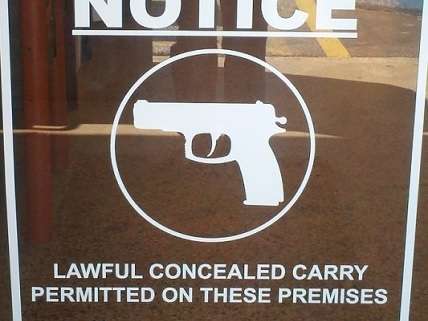Carry a Gun—Without a Permit
If you have to ask permission, it's a privilege, not a right. And maybe you shouldn't bother to ask.

"The eight-year assault on your Second Amendment freedoms has come to a crashing end," President Trump claimed on Friday while addressing a National Rifle Association gathering in Atlanta. "No longer will federal agencies be coming after law-abiding gun owners."
Well, that's a relief. I was afraid the feds were risking repetitive strain injuries. It's time for them to change things up and bash on some other freedoms. Somehow, I'm sure we can count on them to do just that.
But relief for self-defense rights might well be a thing, especially outside the nation's capital. Look, for example, at the growing ranks of states recognizing people's right to discreetly carry weapons without first seeking government approval.
That's a practice I sometimes jokingly call "New York carry," though I inevitably confuse people when I do. New York doesn't encourage carrying a gun without a permit, they protest! Well, actually, it kind of does. When I worked in New York City in the 1990s, getting permission to just legally own a handgun was an ordeal (which I've described elsewhere), and a carry permit was out of the question for anybody who wasn't well connected. For a while, I worked a job that had me returning to my apartment at 4th Street and Avenue B—a gentrifying but still sketchy neighborhood at the time—in the wee hours of the morning. The criminals, along the route, it seemed, had never received the memo about the city's restrictive gun laws. Believe me, I carried.
I met others who did the same. With the city's tight restrictions, most of the guns they owned were already off the books, putting carry permits that much further out of reach. But people still felt the need for protection for themselves and their families. And so they did what they considered necessary and right whether lawmakers liked it or not: New York carry.
When done legally, as is increasingly possible across the country, toting a gun without a permit is often called "constitutional carry" based on the argument that the Constitution is all the license Americans need to exercise their rights. Texas, which loosened some gun restrictions in recent years, may be the next state to drop requirements for concealed carry permits. But if Texans don't move fast, Alabama could beat them to the punch. Or South Carolina could do the honors. Even Wisconsin is considering eliminating permit requirements for concealed carry, with the endorsement of State Attorney General Brad Schimel.
But they're all laggards. New Hampshire eliminated the requirement for concealed carry permits in February. North Dakota did the same a month later. Missouri had them beat, with a measure passed last fall. South Dakota would have followed suit, if the governor hadn't vetoed the bill while insisting that threatening people with arrest and confinement to a cage for carrying the means of self-defense constitutes "protecting the lives of our citizens."
In all, 14 states now have some form of constitutional carry—starting with Vermont, which never imposed any restrictions to begin with. Montana eliminated restrictions in 1991, with other states following. Note that some of those 14 states limit full enjoyment of the freedom to state residents, according to GunLaws.com.
Why the push to eliminate permit requirements for concealed carry when just getting the authorities to let us legally carry the means for self-defense was such a big deal just a few years ago? After all, the push for carry permits has been successful not just legally, but in its reception by the public. Permits are widely popular and defensive weapons have become an important part of many Americans' lives (much to the distress of opponents).
Well, the philosophical rationale should be clear; if you have to ask permission, it's a privilege, not a right. Permission can be rescinded, and is always exercised at the sufferance of whoever is empowered to say "yes" or "no." A license to speak your mind granted in place of First Amendment protections, or an annual fee to keep the cops from tossing your house as a substitute for Fourth Amendment restrictions on search and seizure, might give you a little breathing room, but each breath would be drawn in the shadow of fears about lost paperwork or pissed-off officials. Owning and carrying the means to defend yourself is no different, with the rights embodied in the Second Amendment at odds with any requirement that their exercise requires a stack of forms filled out and filed.
Then there are practical fears about the ever-simmering controversy over firearms. After the publication of gun owners' names and addresses by news outlets in New York, who really wants to add themselves to lists that may well be harvested by opponents of self-defense rights? Putting yourself on those lists runs the very real risk of painting a target on your back for political enemies, or for officials enforcing potentially tighter laws under a future regime. It's much safer, when exercising freedoms that drive some people into hostile frenzies, to stay under the radar.
Which brings us back to constitutional carry, an improvement on my own New York carry. As it is, plenty of well-intentioned people already carry without permits, in restrictive jurisdictions, out of principle, or to avoid unwelcome entries in databases. Legalizing the practice allows people to deal with dangers to life, limb, and property while also minimizing legal peril.
Well, until the political winds shift again and politicians turn their unwanted attention back to practitioners of self-defense rights. But that possibility is all the more reason to deny them lists of our names to work from.


Show Comments (124)